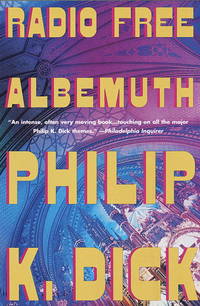Though hailed during his lifetime by peers such as Stanislaw Lem, Dick received little public recognition until after his death, when several popular film adaptations of his novels introduced him to a larger audience. His work is now some of the most popular in science fiction, and Dick has gained both general acclaim and critical respect.
Discarding the optimistic and simple world-view of Golden Age science fiction, Dick consistently explored the themes of the nature of reality and humanity in his novels, which were populated by common working people, rather than galactic elites. Foreshadowing the cyberpunk sub-genre, Dick brought the anomic world of Northern California to many of his works. His acclaimed novel,
The Man In the High Castle (1963, winner of the Hugo Award), is a pioneering work bridging the genres of alternate history and science fiction. He also produced a tremendous number of short stories and minor works which were published in pulp magazines.
His works are characterized by a constantly eroding sense of reality, with protagonists often discovering that those close to them (or even they themselves) are secretly robots, aliens, supernatural beings, brainwashed spies, hallucinating, or some combination of the above.
Dick experimented with mind-altering drugs, though he often denied that they were influences on his work.
Philip K. Dick was born in Chicago, to Dorothy Kindred Dick. His father, Edgar Dick, was a fraud investigator for the United States Department of Agriculture. He had a twin sister, Jane. Both children were born six weeks premature, and the girl died on January 26, 1929. Shortly thereafter, the family moved to California.
Dick's parents divorced when he was young; he grew up with his mother. He went to high school in Berkeley and briefly attended the University of California, Berkeley, where he majored in German. He sold records and was a disk jockey before selling his first story in 1952. He wrote full-time, more or less, from that time forward. He sold his first novel in 1955. The 1950's were a hard-scrabble time for Dick, so much so that, as he once said, "we couldn't even pay the late fees on a library book." He associated with the pre-1960's counterculture of California and was sympathetic to beat poets and the Communist Party. In 1963, he won the Hugo Award for The Man in the High Castle. Though Dick was hailed as a genius at this time in the SF world, the literary world as a whole was as yet unappreciative, and so he could only publish books at low-paying SF publishers. Consequently, while he would regularly publish novels for the next several years, he continued to struggle financially and psychologically. Dick was opposed to the Vietnam War and had a file at the FBI as a result.
In his youth, around the age of thirteen, Dick had a recurring dream for a number of weeks. He dreamt that he was in a bookstore, trying to find an issue of Astounding. This issue, when he found it, would contain a story called "The Empire Never Ended", which would reveal to him the secrets of the universe. As the dream repeated, the pile of magazines through which he was searching got smaller and smaller, but he never reached the bottom of it. Eventually, he became anxious that discovering the magazine would drive him mad (like the Lovecraftian Necronomicon, promising insanity to its readers). Shortly thereafter, the dreams stopped. They never returned, but the phrase "The Empire Never Ended" would appear in his later works.
On February 20, 1974 he was recovering from the effects of sodium pentothal administered after the extraction of an impacted wisdom tooth. Answering the door to receive a delivery of additional painkillers, he noticed the woman delivering the package was wearing a pendant with what he called the "vesicle pisces". (He probably was referring to the intersecting arcs of the vesica piscis.) After her departure, Dick began experiencing strange visions. Although this may have initially been attributed to the painkillers, after weeks of these visions, such a rationale becomes less probable. Throughout February and March of 1974 he received a series of visions which he collectively referred to as 2-3-74, shorthand for February/March of 1974. He described his initial visions as laser beams and geometric patterns, and occasionally brief pictures of Jesus Christ and ancient Rome, which he would glimpse periodically. As the pictures increased in length and frequency, Dick claimed that he began to live a double life, one as himself and one as Thomas, a Christian persecuted by Romans in the 1st century C.E. Despite his current and past drug use, Dick accepted these visions as reality, believing that he had been contacted by a god-entity of some kind, which he referred to as Zebra, God, and most often
Valis.
VALIS is an acronym for Vast Active Living Intelligence System; he used this term as the title of one of his novels, and later theorized that it was a satellite of some kind which used beams to communicate with people on Earth. He claimed that the being used what he called "disinhibiting stimuli" to prep the subjects for the communication, in his case the vesicle pisces.
Most observers of this phenomenon would conclude that Dick's visions were a brief psychotic episode, and they might be correct in that assumption. What has allowed the mystery of Dick's experiences to endure are anecdotal reports of several intriguing incidences such as the following:
At one point, during an encounter with the VALIS, Dick learned that his infant son was in danger of perishing from an unnamed malady. Routine checkups on the child had shown no trouble or illness; however, Dick insisted that thorough tests be run to ensure his son's health. The doctor eventually complied, despite the fact that there were no apparent symptoms. During the examination doctors discovered an inguinal hernia, which would have killed the child if an operation was not quickly performed. The child survived thanks to the operation, which Dick accredited to the VALIS.
Another event was an episode of glossolalia. Dick's wife transcribed the sounds she heard him speak, and Dick wrote that they later discovered that he was speaking an ancient dialect of the Greek language, which he had never studied.
Regardless of the apparent evidence that he was somehow experiencing a divine communication, Dick was unable ever to fully rationalize the events. For the rest of his life, he struggled to fully comprehend what was occurring, questioning his own sanity and perception of reality. He excised what thoughts he could into an 8,000 page, million word journal dubbed the Exegesis. He spent sleepless nights furiously writing into this journal, in some instances high on large quantities of amphetamines, which no doubt contributed to its eclectic tone. A recurring theme in the Exegesis is Dick's hypothesis that history had been stopped in the 1st century, and that the "[Roman] Empire never ended". He saw Rome as the pinnacle of materialism, and that after forcing the Gnostics underground 1900 years earlier had kept the population of the Earth as thralls to worldly possessions. Dick believed that VALIS had contacted him and unnamed others to induce the "impeachment" (read: assassination) of Richard M. Nixon, whom Dick believed to be the current Emperor incarnate.
As time went on, he became increasingly paranoid, imagining plots against him perpetrated by the KGB or FBI, who he believed were constantly laying traps for him. At one point he alleged that they had broken into his house and pilfered various documents, though later he stated that he probably committed the burglary himself, and then forgotten he had done so.
His later works, especially
The Valis Trilogy, were heavily autobiographical, many with 2-3-74 references or influences. Dick was also a voracious reader of works on religion, philosophy, metaphysics, and Gnosticism, and these ideas found their way into many of his stories. His final novel was
The Transmigration Of Timothy Archer. Dick's works may be compared with those of William S. Burroughs, though Dick is arguably less scathing and more philosophical.
Dick married five times, and had two daughters and a son. The first four ended in divorce; the last in his death.
* May 1948, to Jeanette Marlin (lasted six months)
* June 1950, to Kleo Apostolides (divorced 1958)
* 1958, to Anne Williams Rubinstein (children: Laura Archer, born February 26, 1960) (divorced 1964)
* 1966 or 1967 (sources conflict), to Nancy Hackett (children: Isolde, usually called "Isa") (divorced 1970)
* April 18, 1973, to Tessa Busby (children: Christopher)
Philip K. Dick died of a stroke in 1982 without having learned what had caused his strange visions. It has been theorized that Dick suffered from epileptic discharges in his temporal lobe. This can cause subtle, non-disabling seizures which can cause feelings ranging from a general disorientation to visions often construed by the victim as "psychic" experiences or epiphanies. This particular region of the brain allows for differentiation of reality and fantasy and is very sensitive to epileptic discharges. The symptoms which go along with these discharges read like a summary of the last decade of Dick's life. Part and parcel to these kind of seizures is a behavioral phenomenon called "hypergraphia", where the subject begins obsessively documenting their experiences, usually in journal form.
After his death (he was disconnected from life support on March 2, but his EEG had been flat for five days prior to that), his father Edgar, who was still alive at that point, brought his son's body to Fort Morgan, Colorado. When his twin Jane had died, a tombstone had been carved with both of their names on it, and an empty space for Philip's date of death. After fifty-three years, that final date was carved in, and Philip K. Dick was buried beside his sister.
Like other more famous science fiction authors, several of Dick's stories have been made into movies. Most of these are only loosely based on Dick's original story, using them as a starting-point for a Hollywood action-adventure story. While the most admired is Ridley Scott's classic movie Blade Runner, the action film Total Recall faithfully translates a number of Dick themes, albeit with uncharacteristic violence.
Philip K. Dick is often cited as a major influence on the Cyberpunk movement led by William Gibson, but as this work, and titles as diverse as the inventive
Eye In the Sky and
Martian Time Slip, the moving
Galactic Pot-Healer, the complex and yet delicate The Man in the High Castle and the chilling yet deeply moving
A Scanner Darkly show, there was much more to his genius than just influence.
One influence which may considered unusually distant from science fiction within "culture space" is the composition by Tod Machover, and performance, of an opera VALIS.



































